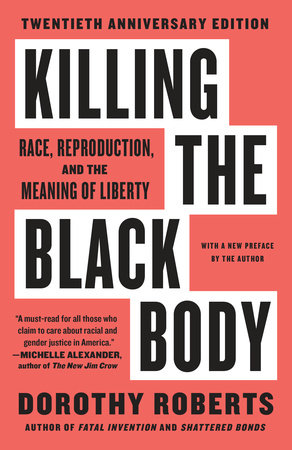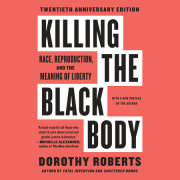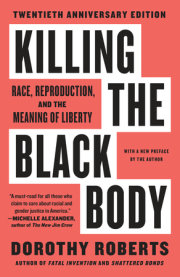This is a no-holds-barred response to the liberal and conservative retreat from an assertive, activist, and socially transformative civil rights agenda of recent years--using a black feminist lens and the issue of the impact of recent legislation, social policy, and welfare "reform" on black women's--especially poor black women's--control over their bodies' autonomy and their freedom to bear and raise children with respect and dignity in a society whose white mainstream is determined to demonize, even criminalize their lives. It gives its readers a cogent legal and historical argument for a radically new , and socially transformative, definition of "liberty" and "equality" for the American polity from a black feminist perspective.
The author is able to combine the most innovative and radical thinking on several fronts--racial theory, feminist, and legal--to produce a work that is at once history and political treatise. By using the history of how American law--beginning with slavery--has treated the issue of the state's right to interfere with the black woman's body, the author explosively and effectively makes the case for the legal redress to the racist implications of current policy with regards to 1) access to and coercive dispensing of birth control to poor black women 2) the criminalization of parenting by poor black women who have used drugs 3) the stigmatization and devaluation of poor black mothers under the new welfare provisions, and 4) the differential access to and disproportionate spending of social resources on the new reproductive technologies used by wealthy white couples to insure genetically related offspring.
The legal redress of the racism inherent in current American law and policy in these matters, the author argues in her last chapter, demands and should lead us to adopt a new standard and definition of the liberal theory of "liberty" and "equality" based on the need for, and the positive role of government in fostering, social as well as individual justice.
This book will be crucial for readers interested in legal theory, American history, feminism and the contemporary politics of race.
"A must-read for all those who claim to care about racial and gender justice in America." —Michelle Alexander, author of The New Jim Crow
"Race in America cannot be fully understood without reading this compelling investigation. . . . Timely, insightful and unforgettable." —Bryan Stevenson, author of Just Mercy
“In asking us to acknowledge the centrality of reproductive justice to the larger quest for racial justice, and indeed liberty writ large, Killing the Black Body insists that the complex
issues that define black women’s path toward reproductive liberty constitute the precondition for understanding the entire field of women’s reproductive rights.” —Angela Davis
“Monumental. . . . An important contribution to the literature of civil rights, reproductive issues, racism and feminism.” —San Francisco Chronicle
“An important publication for new generations of scholars and activists who will be educated and inspired by Roberts’s humanity, acumen and courage. Killing the Black Body draws back the curtain on a breathtakingly brutal legal assault.” —Harriet Washington, author of Medical Apartheid
“In this volume Dorothy Roberts delves deeply, brilliantly into questions that haunted the earliest moments of American history and remain deeply salient today. . . . This book should be read by all who are concerned with inequality in the United States.” —William Jelani Cobb, author of The Substance of Hope
“Chilling. . . . It becomes difficult to reject the author’s thesis . . . that there is a sustained, and in some quarters deliberate, campaign to punish Black women—especially the poor—for having children.” —The National Law Journal
“An important and riveting book that skillfully and compellingly explains contemporary challenges to reproductive freedom.” —Patricia Hill Collins, author of Black Feminist Thought
“Compelling. . . . Deftly shows how distorted and racist constructions of black motherhood have affected politics, law, and policy in the United States.” —Ms.
Selected for Common Reading at the following colleges and universities:
Roosevelt University










